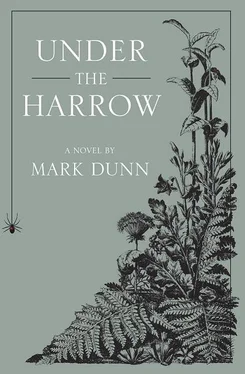“I had been wanting to speak to you about this other important matter for quite some time, but Matilda wouldn’t let me. ‘Let sleeping dogs lie,’ said she. ‘But,’ said I, ‘Frederick Trimmers isn’t a dog, or at least not the sort of dog to bare the gums and make things unpleasant for us. Nor do I think that what I have to convey should do anything but bind us stronger in our society with one another.’”
“Then by all means, you must tell me.”
My companion nodded. He took a deep breath, and then in a soft voice he began: “There is a great secret that has been kept from you and your brother. I have known it for some time.”
“Yes?”
Suddenly the drink didn’t taste so vile. I drank it heartily to quell the feeling of unease rising up within my breast.
I could count perhaps upon the fingers of a single hand the number of times that Harry Scadger and I had sat and spoken thoughtfully and earnestly with one another. Society and circumstances didn’t generally permit it. Yet I had always enjoyed my exchanges with this unique man. He was perspicacious and quite bright, and our encounters had always left me with a better sense of things, my understanding having been illuminated by the fresh, articulate perspective of his simplified station.
If one hadn’t been told that Harry Scadger was amongst the poorest men in the Dell, one should think him to be nothing short of scholar, teacher, or even erudite member of the Petit-Parliament. Soon I would learn the reasons why.
For in addition to his intuitive intellect and common sense, Harry had been favoured, when just a boy, by the kindness of a mysterious benefactor. “The man had sent word to the apricot grove,” Harry revealed, “that my brothers and I would be provided a tutor, whose services would be paid in full by the benefactor. Thus, each of the six sons of Solomon Scadger would be afforded an education, through the learned offices of Dr. Chivery, that elseways would have been denied us by our impoverished and societally estranged circumstances. In spite of the generosity of the offer, my brothers turned it down, preferring to continue as their father had, illiterate and uneducated. I, the second oldest offspring of that family, proved the only exception. For a good many months, I received a singular education from, inarguably, the most brilliant man in Dingley Dell. I received my schooling in the face of the taunts and ridicules of my brothers, my youngest brother save one — Melchisedech (or Mel for short) — even succeeding in dropping, from an overarching limb, a Dinglian grammar upon my head as I took a nap between my studies, and nearly putting me into a state of irreversible insentience.
“Over the years, I’d nurtured this early taste for books that set me apart from my proudly-unread brothers, and this fact drew rancor from them, though Papa remained supportive of my efforts to uplift myself. In point of fact, my father was more than merely supportive, eventually encouraging me to leave the grove and seek my fortune in Milltown. But I refused to go and turn my back on my brothers, who had taken wives and started families and were forever being gulled by every tradesman with whom “Scadger and Sons” (the name facetiously applied to my under-enterprising family by our many betters) did business. Devolved to me was the responsibility of keeping the books, such as they were, on behalf of this collection of knife-sharpeners and basket weavers who seemed to all the valley little more than idiots with industrious fingers. But in staying behind to help my family eke out an existence that kept them all from dropping dead of everything imaginable that could befall a family of pastoral innocents, I put my light under a bushel and pushed all my grand life plans to the back of the hearth shelf. And in Solomon Scadger’s last lingering hours before succumbing to a kick in the head by a passing mule when the driver failed to see a sleeping man lying too close to the road, my expiring father nonetheless found voice enough to thank me for overseeing the family business — and this acknowledgement warmed my heart more than anything else that he could have said in those expiring moments — and reminded me that all of my services to the clan had not been for naught. And there was something else that was said to me by my father in those final pre-mortem breaths. Something really quite extraordinary.
“Papa confessed to me that he was, in fact, not my papa. At least not by blood. And that my brothers are not my brothers-in-full, but only halfbrothers.”
I shook my head in disbelief. “And had he always known that he wasn’t your true birth father?”
Scadger nodded. “But it was in those last moments before his death that he told me —five years ago in August. He revealed to me the name of my true father and the identity of my benefactor, and as one might guess, the two were one in the same.” Harry Scadger expired a deep breath and then in spired a long, contemplative drink of porter.
“And how was it that your brothers’ father could be so certain that you weren’t his blood son?”
“Because I was conceived during his separation from my mother. There was a period of time several months before my birth during which my presumed father lived apart from my mother in the workhouse. Those were the days before he and my mother put down their stakes beneath the apricot trees. They had first lived under the Westminster Bridge with all the other vagrants of Milltown. People-Under-the-Bridge — that is what West Enders call them. Solomon Scadger was taken for tramp and beggar, though in truth he was neither — only a man who had fallen upon hard times. And he was removed to the workhouse, at the same time that my mother and my older brother — then but a baby of two — were shewn kindness and taken in by your own father and mother.”
“My father—?”
“Yes. Your father and my father, for they are both the same.”
“I cannot believe it.”
“You must believe it, for my mother wasn’t one to prevaricate.” Harry raised his hand to seek a fresh pot from the publican. “It is for this reason that Matilda cautioned me against telling it to you. That all the good that may come from our being bound together as brothers might be undermined by the hard truth of how I came to be, by the fact that my mother was taken in carnality by your father whilst both were wed to others. I apologise for speaking so candidly here, but there is no other way for me to present the facts to you.”
I slid back into my chair, numbed by this news, stilled by what the disclosure said about my father. “How is this possible?”
“Your father was kind to my mother and my older brother Sol, each hungry and penniless and clad in rags. But there was a price to be paid for that kindness. And I am the dividend.”
I wished at that hard moment no further company with Harry Scadger, even if his name should, in truth, be Trimmers, and so I stood to go. I had often borne the wrath of my father, as had Augustus. Papa was an angry, bitter, and cynical man who left this Earth (a victim of pipe smoker’s labial cancer) still at odds with everything that life had bestowed upon him — a candidate, if there ever was one, for leaving Dingley Dell in some manner other than a burial box, had he ever found the courage to make his escape. By the same token, Papa was, by turns, a loving man, a compassionate man, who bore the pain of others even as he railed against the general causes of that suffering which was the lot of most of the denizens of Dingley Dell. He was a tangled, convoluted, enigmatic man, whom Gus and I could never fully unravel. And in the end, I could see Papa taking pity on Harry Scadger’s mother in her terrible plight, and then taking her to his bed for the pleasure of her voluptuous body, regardless of how even the thought of such a thing would have shattered my mother.
Читать дальше












